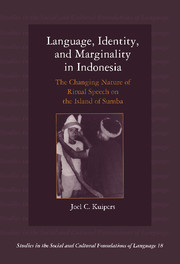 Language, Identity, and Marginality in Indonesia
Language, Identity, and Marginality in Indonesia Book contents
- Frontmatter
- Contents
- List of plates
- List of figures and tables
- Preface
- Acknowledgements
- Notes on orthography
- 1 Introduction
- 2 Place, identity, and the shifting forms of cultivated speech: a geography of marginality
- 3 Towering in rage and cowering in fear: emotion, self, and verbal expression in Sumba
- 4 Changing forms of political expression: the role of ideologies of audience completeness
- 5 Ideologies of personal naming and language shift
- 6 From miracles to classrooms: changing forms of erasure in the learning of ritual speech
- 7 Conclusions
- Notes
- Appendix
- References
- Index
- STUDIES IN THE SOCIAL AND CULTURAL FOUNDATIONS OF LANGUAGE
6 - From miracles to classrooms: changing forms of erasure in the learning of ritual speech
Published online by Cambridge University Press: 05 July 2011
- Frontmatter
- Contents
- List of plates
- List of figures and tables
- Preface
- Acknowledgements
- Notes on orthography
- 1 Introduction
- 2 Place, identity, and the shifting forms of cultivated speech: a geography of marginality
- 3 Towering in rage and cowering in fear: emotion, self, and verbal expression in Sumba
- 4 Changing forms of political expression: the role of ideologies of audience completeness
- 5 Ideologies of personal naming and language shift
- 6 From miracles to classrooms: changing forms of erasure in the learning of ritual speech
- 7 Conclusions
- Notes
- Appendix
- References
- Index
- STUDIES IN THE SOCIAL AND CULTURAL FOUNDATIONS OF LANGUAGE
Summary
This final chapter examines the changing forms of erasure employed in the teaching and learning of ritual speech, changes that contribute to the ways in which ritual speech as a register has shifted in its uses. By selectively ignoring (“erasing”) the diversity of speech varieties, the ideologies of language learning – both colonial and post-colonial – create an image of what ritual speech is ideally. Learning ideologies contributed to the shift in these ideals from “angry” to “humble,” from exemplary to marginal, from sacred to secular. The practice of learning ritual speech was once described as a totalizing experience involving miraculous inspiration, an experience that designated the learner as central and exemplary. Ability to perform verbally alone was seen as an act of spontaneous anger and boldness that was central to one's identity as competent, but which did not acknowledge the contributions of teachers, nor did it recognize the gradual and systematic process by which learning was (and is) interactively accomplished. Classroom schooling, on the other hand, requires not solo performance or anger so much as respectful response; one must learn active audiencing practices. Teachers occasionally code-switch, and borrow between Indonesian and Weyewa, sending subtle messages to the children about the relative merits of each. When they switch into Indonesian they are implicitly suggesting to students what kinds of things are “better said in Indonesian.” Ritual speech, seen as a variety of the local language, is relegated to a marginal area of the curriculum devoted to sports, regional folklore, and local arts.
- Type
- Chapter
- Information
- Language, Identity, and Marginality in IndonesiaThe Changing Nature of Ritual Speech on the Island of Sumba, pp. 125 - 148Publisher: Cambridge University PressPrint publication year: 1998
